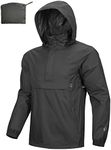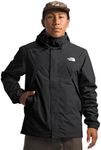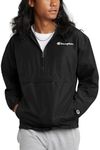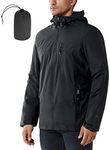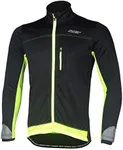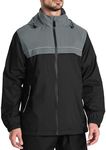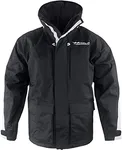Buying Guide for the Best Mens Running Jackets
When choosing a men's running jacket, it's important to consider various factors to ensure you get the best fit for your needs. A good running jacket should provide comfort, protection from the elements, and enhance your performance. Here are some key specifications to consider when selecting a running jacket.MaterialThe material of a running jacket is crucial as it determines the jacket's breathability, weight, and weather resistance. Common materials include polyester, nylon, and blends with spandex for stretch. Lightweight materials are ideal for mild weather, while heavier, insulated materials are better for colder conditions. Choose a material that suits the climate you'll be running in and your personal comfort preferences.
Water ResistanceWater resistance is important if you plan to run in wet conditions. Jackets can range from water-resistant to fully waterproof. Water-resistant jackets are suitable for light rain or drizzle, while waterproof jackets are designed to keep you dry in heavy rain. Consider the typical weather in your area and how often you run in the rain to determine the level of water resistance you need.
BreathabilityBreathability refers to how well the jacket allows moisture and heat to escape, keeping you dry and comfortable. High breathability is essential for intense workouts to prevent overheating and excessive sweating. Look for jackets with ventilation features like mesh panels or zippered vents if you tend to run in warmer conditions or have high-intensity workouts.
FitThe fit of a running jacket affects your comfort and range of motion. Running jackets typically come in slim, regular, and relaxed fits. A slim fit is more aerodynamic and reduces wind resistance, making it ideal for competitive runners. A regular fit offers a balance of comfort and performance, while a relaxed fit provides more room for layering and is suitable for casual runners. Choose a fit that matches your running style and comfort preferences.
WeightThe weight of the jacket can impact your performance and comfort. Lightweight jackets are great for mild weather and high-intensity runs as they won't weigh you down. Heavier jackets with insulation are better for cold weather to keep you warm. Consider the typical weather conditions you run in and your preference for layering when choosing the weight of your jacket.
ReflectivityReflectivity is an important safety feature if you run in low-light conditions, such as early morning or evening. Reflective elements on the jacket enhance your visibility to others, reducing the risk of accidents. Look for jackets with reflective strips or patterns if you often run in the dark or in areas with low visibility.
PocketsPockets can be a convenient feature for carrying essentials like keys, phone, or energy gels. Some jackets have zippered pockets to keep items secure, while others have open pockets for easy access. Consider how much you need to carry during your runs and choose a jacket with the appropriate number and type of pockets.
HoodA hood can provide extra protection from the elements, such as rain or wind. Some jackets have detachable hoods, allowing you to remove them when not needed. If you frequently run in unpredictable weather, a jacket with a hood can be beneficial. Consider whether you prefer a fixed, adjustable, or detachable hood based on your running conditions and personal preference.
